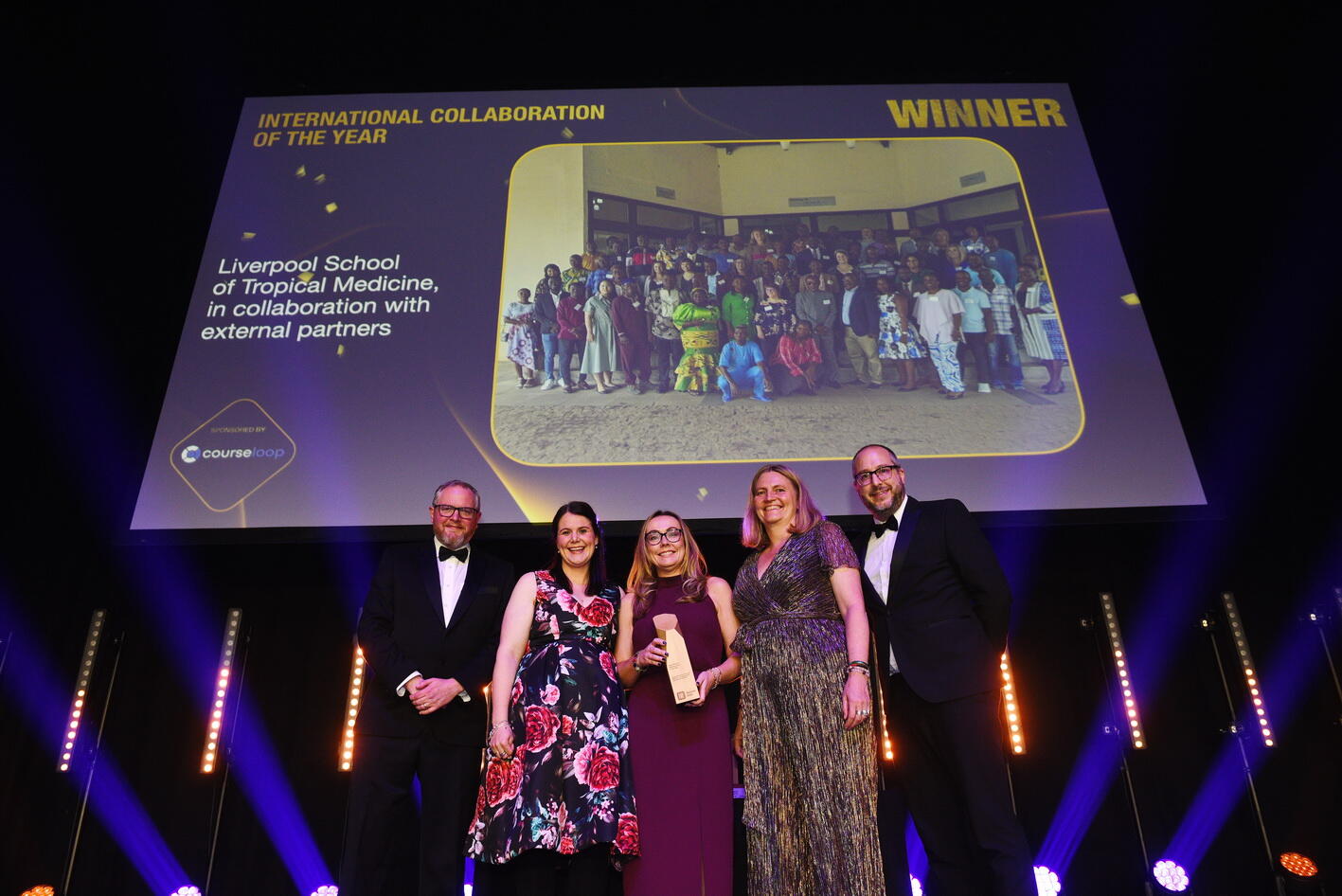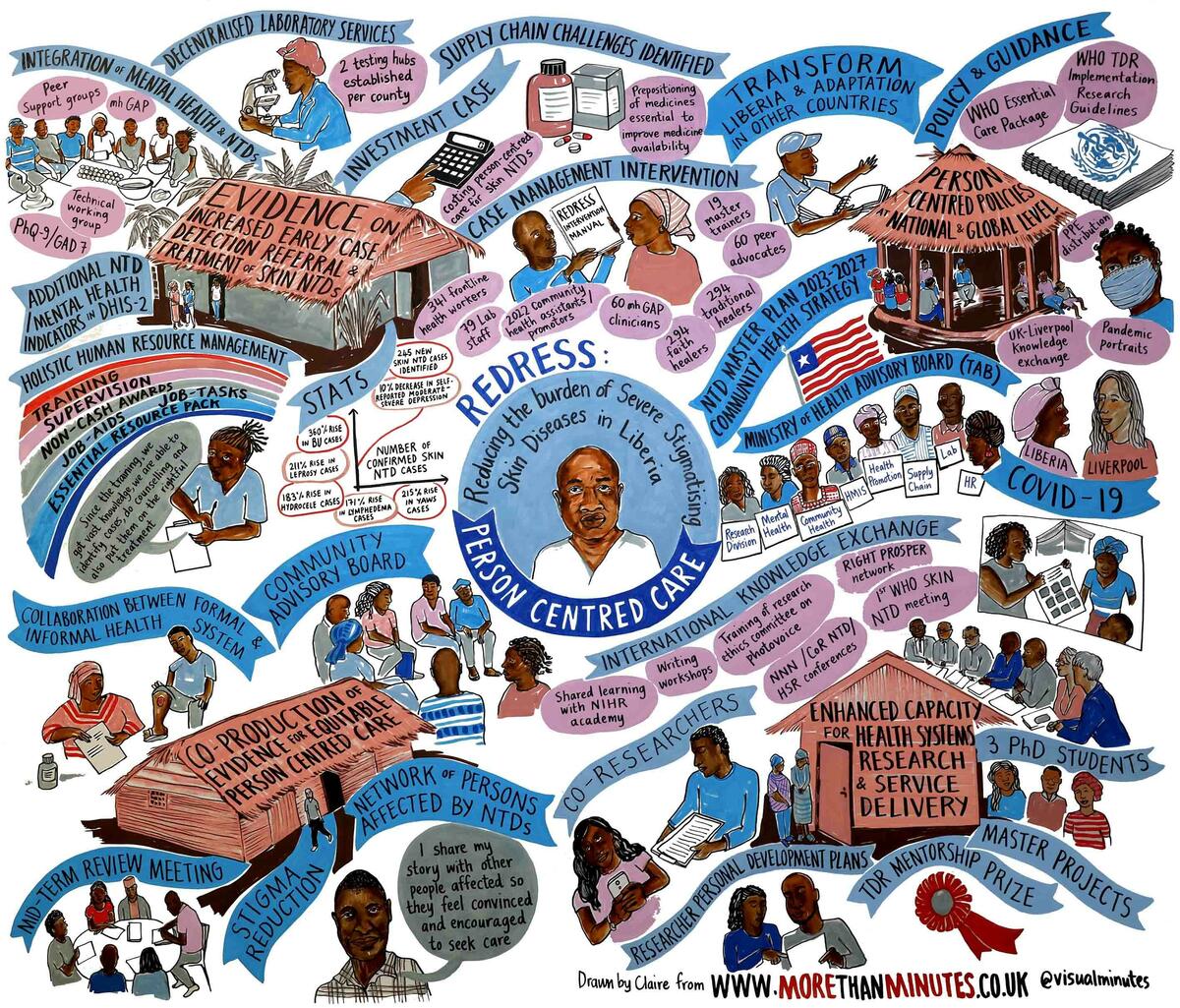
An international research consortium tackling skin neglected tropical diseases (NTDs) in Liberia has won one of higher education’s top awards.
REDRESS, led by Liverpool School of Tropical Medicine and the Ministry of Health in Liberia, took home the prize for International Collaboration of the Year at last night’s Times Higher Education Awards, the sector’s flagship event that celebrates the talent, innovation and commitment of people across all aspects of university life.
The International Collaboration of the Year prize recognises exceptional projects carried out between a HE institution and one or more international partners.
This was the 20th anniversary of the awards – dubbed the “Oscars of higher education” – held at the ICC in Birmingham.
Over the last five years, the REDRESS team has been working to improve care, integrate mental health support and combat marginalisation and discrimination for people affected by skin NTDs in Liberia.
REDRESS brings people affected by severe skin NTDs, their families and communities, alongside research partners and the Ministry of Health in Liberia together to generate innovative contextually relevant solutions to ongoing challenges. By adopting a person-centred approach, they identify, test and adapt health interventions to improve the equitable management of skin NTDs.
The project was hailed by judges as “an excellent example of long-term, large-scale, internationally collaborative research, spanning multiple countries, agencies, community and patient groups.”
Judges further praised REDRESS for its emphasis on equitable partnerships, and evidence of its impact at multiple levels, from government policy to training clinical staff. The project has informed policy and official guidance in Liberia, and is influencing training in Nigeria and the Democratic Republic of Congo. The REDRESS team wrote a guide for THE Campus for other HE institutions on lessons learned for co-producing research with affected communities.

The award was collected by Professor Sally Theobald, Dr Laura Dean and Dr Julie Irving from the REDRESS project.
Dr Dean, Reader of Social Science and International Health at LSTM, and academic lead on REDRESS, said: “We are privileged to have worked with an extensive team in Liberia to deliver the REDRESS programme. The idea of REDRESS was generated in partnership with the Ministry of Health, including Mr John Brimah and we would like to dedicate this award to John.
“Through this award we would like to recognise the innovation in health systems reform that can be driven by people with lived experience.
“We would like to thank the Times Higher Education Awards for an excellent evening, and acknowledge their essential support to Cara, a lifeline to academics at risk in fragile settings. Liberia has known this type of fragility and we are grateful to the academics we have worked with in Liberia who continue to make significant contributions to the health and well-being of their country.”
The REDRESS team wrote a tribute to John Brimah in 2022.
REDRESS is funded by the National Institute for Health Research (NIHR), with additional support from the Anesvad Foundation. Its collaborating partners include University of Liberia, Pacific Institute for Research and Evaluation, Action Transforming Lives, Queen Margaret University, Effect:Hope, American Leprosy Mission and The Carter Center, Liberia.
THE Awards
LSTM were also represented at last night’s THE Awards by the Health Equity Liverpool Project (HELP), which was shortlisted for Knowledge Exchange/Transfer Initiative of the Year. HELP, an innovative community-focused public health programme, has helped to tackle health inequities in underserved communities in Liverpool.
In 2023, at the start of LSTM’s 125th anniversary year, the school was shortlisted for University of the Year – the THE Awards’ top prize.
John Gill, THE Editor, said: “The votes are counted, the garlands awarded, and on the 20th anniversary of the THE Awards we have another crop of exceptional winners. The occasion brought a record number of submissions detailing, as ever, a dazzling array of achievements from institutions, teams and individuals, and demonstrating that even though times are tough, the creativity and energy in UK and Irish universities remain undiminished.”